Traditional tracking is expensive, time-consuming and difficult to action. Upsiide allows us to efficiently track behaviors and attitudes in real-time.
Insights folks and marketers often turn to Upsiide for brand tracking. Upsiide tracking helps organizations identify their position in the market, assess the strengths and weaknesses of their brands, and ultimately find opportunities for growth.
But brands aren't the only thing you can track on Upsiide. We’ve conducted a range of tracking studies on the Upsiide platform:
This report demonstrates how the Upsiide platform can track the shifting appeal of various political policies. Our first wave of political policy tracking was conducted in 2020. We are now revisiting these policies in 2023 to understand how the appeal has shifted over the past three years.
What we set out to learn
Choice requires context
Our political attitudes are an interlaced network. If we know that someone is concerned about immigration, government spending and national security, we can make educated guesses about their opinion on other issues that might superficially seem unrelated.
We wanted to understand this pattern of relationships. This requires an interface like Upsiide Idea Screen, which allows us to explore a large range of issues with each respondent, understanding the tradeoffs that they make as they prioritize some issues over others.
How attitudes are shifting
The purpose of all tracking is to understand how attitudes and behaviors are shifting over time. This study provides a picture of the shifts that have occurred since the 2020 election and the shifts that have occurred as we move from a COVID to a post-COVID world. More recently, has the Silicon Valley Bank collapse affected interest in financial regulation.
What we discovered
Insight #1. Attitudes towards gun control are shifting
One of the most significant shifts we see between 2020 and 2023 is increasing receptivity toward gun control.
"Tighten background checks on gun buyers" advanced from the 6th most popular policy in 2020 to 3rd place in 2023. "Universal background checks on gun buyers, including peer-to-peer sales," is now the 4th most popular policy idea, from 8th previously.

Tighten background checks on gun buyers

Universal background checks on gun buyers, including peer-to-peer sales
Other gun-related ideas also saw increased Idea Score results. "Fund more research into preventing gun violence" rose by 17 points since the first wave and ranks #14 in 2023, compared to #35 in 2020. Similarly, "Limit the number of guns a person can buy to one per month" is up by 13 points and moved to the 21st place.

Fund more research into preventing gun violence

Limit the number of guns a person can buy to one per month
Interestingly, gun violence is something that both Democrats and Republicans consider alarming.
"Universal background checks on gun buyers including peer-to-peer sales" ranks 17 points higher in 2023 among Republicans. Meanwhile, Democrats are more concerned about researching gun violence: "Fund more research into preventing gun violence" grew by 16 points in 2023 vs. 2020.
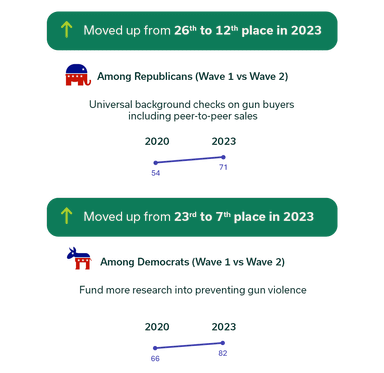
We discovered more political issues that unite Democrats and Republicans. Discover them below.
There are some nuanced variations in policy preferences when we look at demographic subgroups. For example, females are more policy-driven when it comes to gun control, whereas males focus more on personal actions. Women express a strong desire for increased research into preventing gun violence and support measures to hold negligent gun manufacturers and sellers accountable. In contrast, men emphasize the importance of limiting the number of guns an individual can purchase.
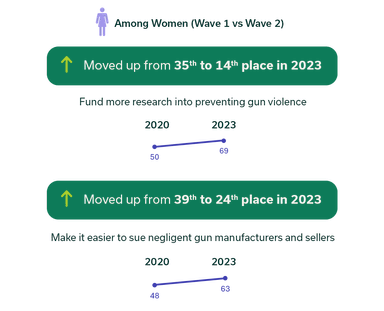
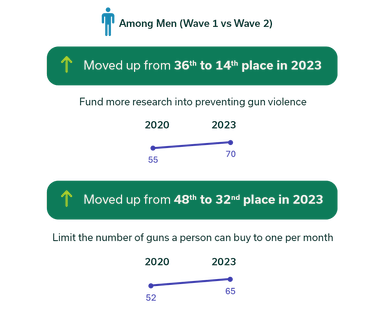
Insight #2. Recent bank failures have not driven increased interest in financial sector regulation
2023 was hard on the finance sector. First Republic Bank, Signature Bank, and Silicon Valley Bank collapsed this year. We wanted to understand if this would increase interest in financial sector regulation.
The results didn't show significant shifts. "Reduce regulations on the financial sector" went down in ranking from the 60 to 71st place. This idea remains in the Rethink quadrant indicating generally low interest and low commitment.

Reduce regulations on the financial sector
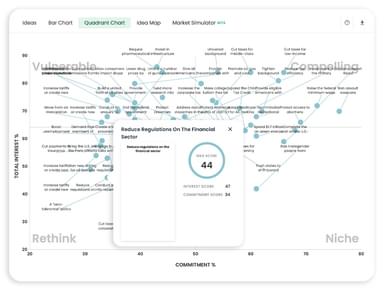
This is a good example of a situation where the general population is not engaged in the issues that interest the business and political classes. Motivating votes to care about financial regulations will be a challenge.
This sentiment aligns with our previous research on banking, where we found that 9 out of 10 brick-and-mortar bank users find it important that their bank helps them achieve their financial goals, but only 2 out of 10 are confident in their banks’ ability to do so; people simply may not expect much from their financial institutions.
Insight #3. Cutting taxes for middle and lower classes remained an important topic both in 2020 and 2023 for many subgroups
We expected that the pressing issues of 2020 and 2023 would affect the performance of policy issues in those respective years. Some of that was true. For example, COVID-related policies were more concerning in 2020. However, the one big topic that continued to be popular in both waves was taxation, especially taxes imposed on middle and lower-income families.
We think this topic remains popular because of growing anxiety about inflation. We discovered from our Economic Sentiment Tracker that consumers feel increasingly pessimistic about the economy and their financial situation. In total, 84% of Americans worry about inflation on daily expenses like food and utilities, and a third thought their personal financial situation was somewhat or very bad.
So, it's understandable that consumers feel an increasing need to cut taxes for certain classes.
Democrats and Republicans both believe that cutting taxes is necessary. While the Republicans want taxes to be cut for the middle class, Democrats want the same for low-income earners.
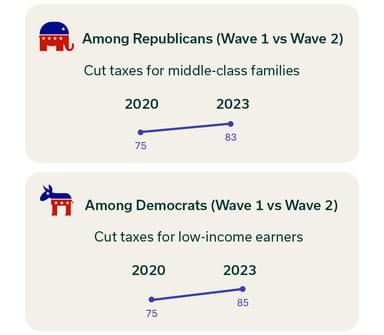
Hispanic and African-American consumers believe that cutting taxes for lower classes is more concerning today.
Cut taxes for low-income earners
It's also worth mentioning that taxation is very much a personal issue for many Americans - i.e. they aren't concerned about business taxation. "Cutting taxes for corporations" is the lowest-ranking idea in 2023, and its interest dropped from 2020. In light of recent economic challenges, there is an increased focus on directing money from corporations to individuals (especially low and middle-income individuals).
Cutting taxes for individuals vs. corporations
So what are the key learnings?
The shifting environment in 2020 and 2023 has affected what policies people value. With the global pandemic rampaging outside their homes, American consumers were more concerned about COVID-related issues in 2020. In the inflationary economic environment of 2023, they want the government to ease their financial load.
As the news about gun violence and gun laws spread around the US over the past few years, people's interest in this topic grew too. In contrast, news of the failure of American banks didn't have much effect on consumers' choices.




